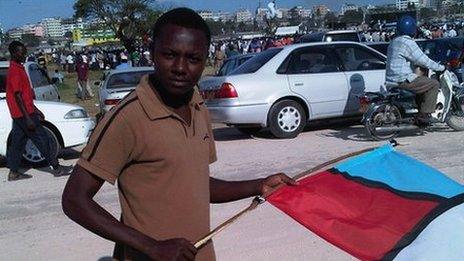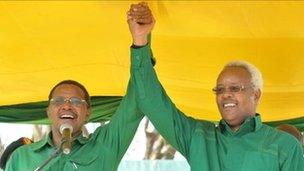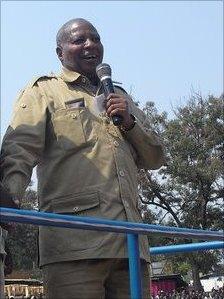Can elections help Tanzania tackle corruption?
- Published

Eighteen-year-old Moshi is looking forward to election day
As he gets set to vote for the first time in his life in Tanzania, there is one thing at the top of 18-year-old Moshi's mind.
"I will vote against corruption... I can't elect corrupt politicians," he says.
Next Sunday, 31 October, Tanzania holds elections for both the president and the parliament.
Moshi plans to vote for the main opposition challenger for the presidency, Willibrod Slaa of the Chadema party.
Mr Slaa shot to prominence because of his courage in parliament where he consistently exposed corruption scandals, and he is now drawing big crowds at his election rallies up-and-down the country.
He is cashing in on people's feelings towards corruption, and has promised to fight it - earning himself a wide following among the youth.
His message to voters has been clear: "The CCM [ruling party] cannot fight corruption because it is the product of corruption... If elected, we will fight corruption from the top."
Corruption record
Within Africa, Tanzania is not often singled out for its poor record on corruption.
But it has had its fair share of major corruption scandals in the past few years, running into hundreds of millions of dollars, and implicating many of the highest-placed figures in the country.
And a recent index drawn up by the Revenue Watch Institute, external put Tanzania close to the bottom of a global list in terms of the transparency of its mining and minerals deals - only Algeria, Democratic Republic of Congo, Equatorial Guinea and Turkmenistan scored worse.
"Tanzania needs a complete and immediate revolution in the system of accountability and leadership," says activist Ananilea Nkya, who won an award from the US embassy earlier this year for her "courage".
When President Jakaya Kikwete came to power in 2005, it was largely on an anti-corruption ticket.
And launching his campaign this time round, he defended his record.
"The government, in the past five years, has fought corruption zealously. We have amended the anti-corruption laws and we have strengthened the anti-corruption bureau.
"All the people are witnesses on how many prominent people have been taken to court for corruption, what else do you want us to do?"
Top names accused
The former Finance Minister Basil Mramba, the ministry's permanent secretary Gray Mgonja, and the former Energy and Minerals Minister Daniel Yona are currently battling corruption allegations in court.
The trio are charged with abuse of office over an allegedly irregular awarding of a contract to audit gold.

President Kikwete (L) campaigned with Edward Lowassa (R) who resigned amid corruption claims
In 2008 the Governor of Tanzania's Central Bank, Daudi Ballali, was sacked after an independent international audit found the bank had paid out more than $100m (£66m) to local companies, some of which reportedly did not exist.
Soon afterwards, the then Prime Minister Edward Lowassa and two ministers resigned, amid a huge public outcry over their alleged involvement in awarding a big contract to a ghost US electricity company.
They all maintained their innocence, but the so-called Richmond affair gripped the nation.
All this is presented as a victory by President Kikwete and the ruling Chama Cha Mapinduzi (CCM), external party.
"Our party is committed towards fighting corruption. Those who are accused of grand corruption are in court, and the president has demonstrated that he tackles corruption from the top," said CCM campaign manager Abdulrahman Kinana.
Real justice?
But critics are not convinced that real action is being taken.
Early this year the ruling party convened and cleared those implicated in the Richmond affair of any wrongdoing.

Willibrod Slaa is presenting a strong challenge to President Kikwete
And at the Central Bank - although a few relatively low-level businessmen were charged along with some junior central bank staff - no high-profile personality has ever appeared before the dock.
"Those in court are scapegoats," said Mr Slaa.
And the country's most popular newspaper columnist, Ansibert Ngurumo, believes corruption is worse now than under previous governments.
He cites the handling of the controversial military radar deal between Britain's BAE and the Tanzanian government.
Former Attorney General Andrew Chenge was allegedly linked to the deal and - although he denied wrongdoing - he resigned after reports that he held a large sum of money in an offshore bank account.
But now, while Mr Chenge has been appointed a member of the ruling party's ethics committee, Mr Ngurumo says he has been summoned three times by state agents over his critical newspaper articles.
President Kikwete is tipped to win another term in office in these elections, but with a smaller margin than the 80% he scored last time round.
Whatever the outcome, Tanzanians will be watching their leader's next moves closely.